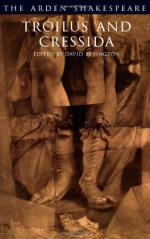|
This section contains 6,308 words (approx. 22 pages at 300 words per page) |

|
SOURCE: "'Still Wars and Lechery': Shakespeare and the Last Trojan Woman," in Arms and the Woman: War, Gender, and Literary Representation, edited by Helen M. Cooper, Adrienne Auslander Munich and Susan Merrill Squier, The University of North Carolina Press, 1989, pp. 25-42.
In the following essay, Helms compares earlier versions of the fall of Troy including the Iliad, the Trojan Women, and Chaucer's Troilus and Criseyde to Shakespeare 's Troilus and Cressida and examines the eroticization of violence and the militarization of Cressida's sexuality in Shakespeare's play.
Concidit virgo ac puer.
Bellum peractum est.—Seneca, Troades
Throughout Shakespeare's Troilus and Cressida, Thersites' bitter cry echoes and reechoes: "Lechery, lechery, still wars and lechery; nothing else holds fashion" (5.2.194-95). It is a cry from which Shakespeare scholars long turned in disgust, dismissing Troilus and Cressida as vicious and cynical, a cruel misrepresentation of both Homer's heroic warriors and Chaucer's courtly...
|
This section contains 6,308 words (approx. 22 pages at 300 words per page) |

|


